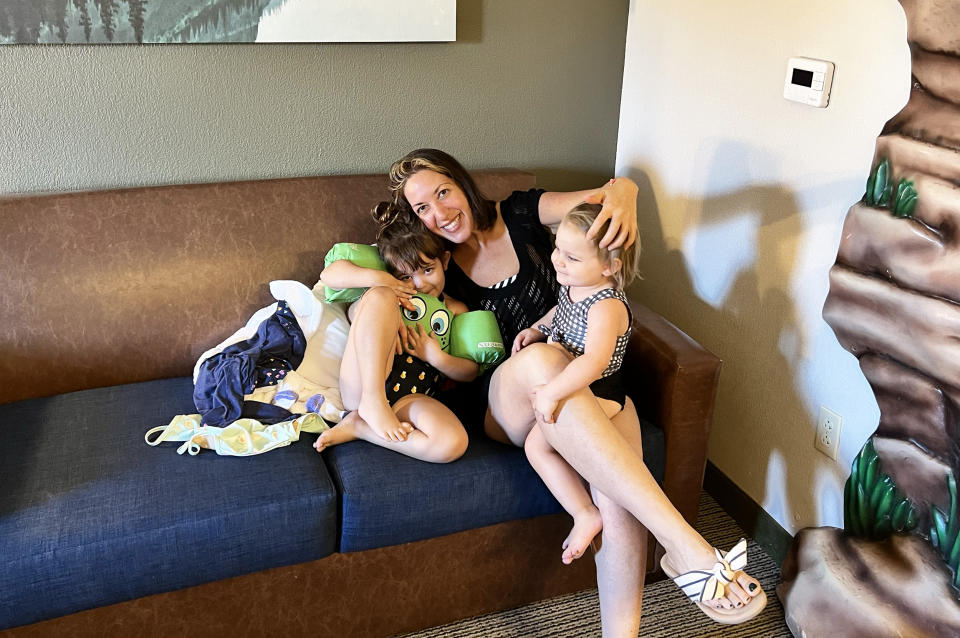New postpartum depression pill changes mom’s life: 'Can’t imagine where I’d be’
The apathy started almost immediately after Sahar McMahon gave birth to her second daughter, Lenora, in November 2020. When they returned home, she never took Lenora anywhere like she did with her first daughter, Ophelia. At the time, she rationalized the COVID-19 pandemic was reason not to do anything.
“I could walk around. I could stay in my yard with friends. I (could) go to the playground, and I wasn’t doing any of that,” the 39-year-old from New York City tells TODAY.com. “My husband was coming home and going, ‘Why haven’t you gotten dressed? The girls aren’t dressed. What have you eaten today?’ I’m like, ‘I don’t know.’”
McMahon started wondering what the point of life was.
“That did start to scare me that I would have crying spells or periods where I would go into my room and close the door while my kids were screaming while they clearly needed me,” she says. “(I’d) be by myself and think, ‘What is any of this for? Why?’”
Often, she put on Disney+ for her children while she sat alone in her room. This was a huge difference from all the playgroups and mommy and me classes Ophelia enjoyed. McMahon began looking online for explanations as to why she was feeling so “meh.” She didn’t think it was postpartum depression at first because she didn’t feel like she wanted to hurt herself or Lenora, and that’s what she thought the symptoms were.
“I wasn’t connecting with her,” she says. “I knew I loved her, but I resented her nursing. I resented her crying. We were just existing.”
She enrolled in a clinical trial for a new medication treatment for postpartum depression. At the time, she didn’t know if she had received the medication, zuranolone, or the placebo. (The study was double-blind, meaning neither patients nor researchers knew who received the drug or the placebo until after the trial ended.)
On Friday, the U.S. Food and Drug Administration approved Sage Therapuetics and Biogen's joint application for zuranolone, now called Zurzuvae, making the first pill available to treat postpartum depression.
“That is potentially a game-changer," Dr. Roshini Raj, associate professor of medicine at NYU Langone, said on TODAY on Aug. 7. "The only other medication that’s FDA-approved for (postpartum depression) is actually an IV infusion of the same kind of drug, but it requires an IV that needs to be given in the hospital for 60 hours.”
After taking one dose in the clinical trial, McMahon noticed a difference and later got confirmation she was taking zuranolone.
“I woke up the day after, and I’m like, OK, I’ve got things to do, like the dishes aren’t done. The laundry is started but not moved into the dryer. I’ve got to figure out how to care for this kid,” she recalls. “I felt like myself. I felt clearer.”

She took the pill for the full two-week treatment course and felt even better when she finished. “This was life changing for me,” she says.
Postpartum depression and its treatment
The U.S. Centers for Disease Control and Prevention estimates that one in eight people experience postpartum depression, which may start in pregnancy and can last at least nine months following birth, says Dr. Kristina Deligiannidis, principal investigator of the zuranolone clinical trials.
Symptoms of postpartum — also called perinatal depression — mirror those of clinical depression and can include:
Severe sadness
Loss of interest
Increased feeling of guilt
Loss of energy
Loss of appetite
Increased anxiety and irritability
Feeling overwhelmed
An inability to bond with the child
“Their main complain is they feel overwhelmed and anxious,” Deligiannidis, a behavioral science professor at the Feinstein Institutes for Medical Research, tells TODAY.com. Deligiannidis has served as a consultant for and received grants from Sage Therapeutics for the zuranolone clinical trials.
In a recent study published in the American Journal of Psychiatry, Deligiannidis and her colleagues randomly assigned 196 patients into two groups. One group received zuranolone for 14 days; the other got a placebo. Both groups underwent depression screening before and after the trial. Those who took zuranolone experienced fewer symptoms at day 15 than those who took the placebo.
What’s more, many patients reported a “rapid reduction of depressive symptoms” by day three of taking zuranolone, Deligiannidis notes, whereas SSRIs can take weeks or even months to make a noticeable difference in mood.
The study found the improvement in depression symptoms lasted for 45 days, Deligiannidis adds.
“We didn’t see any return of the depressive symptoms,” she explains. “Even though they have stopped the medicine ... they continue to do well.”
The medication continues to work even after a patient stops taking it because the neuroactive steriods can actually "shift brain networks to a healthy ... state that is more stable," Deligiannidis says, adding more research is needed to fully understand why.
According to the paper, the most notable side effects include feeling dizzy or lethargic, and people did not experience withdrawal symptoms or suicidal ideation after stopping the medication.
Deligiannidis says the pill could transform the treatment of postpartum depression.
“Some women may only need an acute treatment course,” she says. “There may be some other women that have other psychiatric illnesses, such as chronic anxiety disorders or other types of mental health concerns, that may need longer courses.”
Dr. Katherine Taljan, a perinatal psychiatrist at Cleveland Clinic, who was not involved in the study, says zuranolone is a “very exciting, novel treatment.”
But she agrees that because the study only looked at participants after 45 days, it's unclear whether some patients might require longer intervention.
“We might see symptoms return. We don’t know that yet,” Taljan says. “The strength of a treatment like this is that we can break the real downward cycle that can be happening with severe symptoms, and we can get a reset for patients — even if that means that they’re going to be engaged in ongoing treatment with a psychiatrist or therapist.”
She notes that current PPD treatment often lasts months. "I really try to emphasize and just normalize that with my patients,” she says. “It’s OK to need that ongoing support.”
Raj added that another potential benefit of the pill is making it easier for women with severe symptoms to obtain treatment. “This is really going to open up that accessibility to treatment for so many,” she says.
Dr. Samantha Meltzer-Brody, who was also involved in the study, says zuranolone is "very exciting" in terms of how quickly it works. She is an investigator on Sage Therapeutics clinical trials and received research funding from Sage Therapeutics. She hopes the pill could reduce the stigma associated with postpartum depression.
“If you have something (that works quickly and is) convenient to take ... for a short period of time, then it will be a positive step forward,” Meltzer-Brody, the director of the University of North Carolina Center for Women’s Mood Disorders, says. “Most people are going to say, ‘I want to feel better within days,’ particularly during a very vulnerable postpartum period.”
Still, a stigma surrounds postpartum depression, so some who experience it never receive treatment and push themselves through their feelings. Many think their symptoms are normal or feel so much guilt about experiencing them that they do not ask for help.
“We’re only detecting about half of women with perinatal depression at this time. Also, of those, only 10% are getting adequate treatment,” Deligiannidis says. “We’ve got to do better with detection. We’ve got to do better at connecting patients to care.”
Life with two toddlers
When McMahon visited her obstetrician six weeks after delivering Lenora, she filled out a depression assessment, and she thinks she might have also been screened at earlier pediatrician visits. She suspects she downplayed her symptoms.
“I can’t exactly remember,” she says. “I don’t think there was that much focus on me as there was on, ‘Is the kid healthy?’”

After participating in the study, McMahon had no other symptoms of postpartum depression. She’s been staying home with the girls until they both can be in school, but she hopes to return to work in sales or marketing. Since taking the medication, she’s been going to the gym and lost 40 pounds. Now, she and her daughters attend playdates and swimming classes, and McMahon has made mom friends. She finds herself enjoying motherhood more and doesn’t feel as overwhelmed and hopeless when things become tough, such as when she grapples with Lenora's potty training.
“She wants her diaper on. She wants her diaper off,” McMahon says. "It's stressful but hilarious."
Ophelia, 4, loves unicorns, dinosaurs and Venus fly trap plants — she has “eclectic interests,” her mom says. Lenora, 2, is a “bullheaded direct kid. She knows what she wants.” McMahon feels grateful she got access to the new postpartum depression pill.
“I can’t imagine where I would be if I hadn’t been part of that study,” she says.
This article was originally published on TODAY.com

